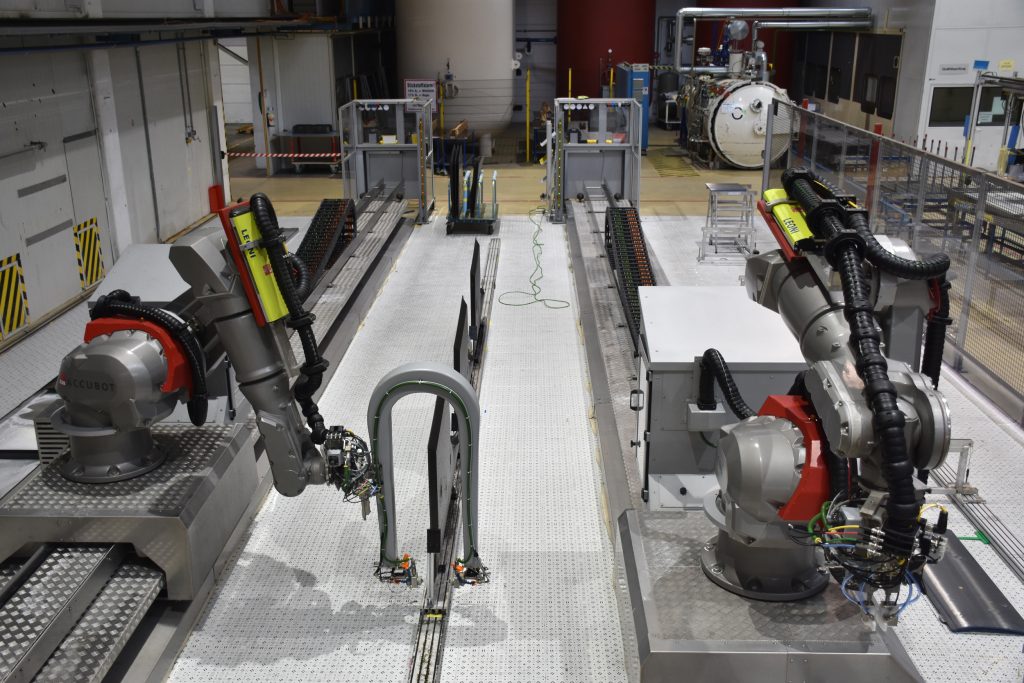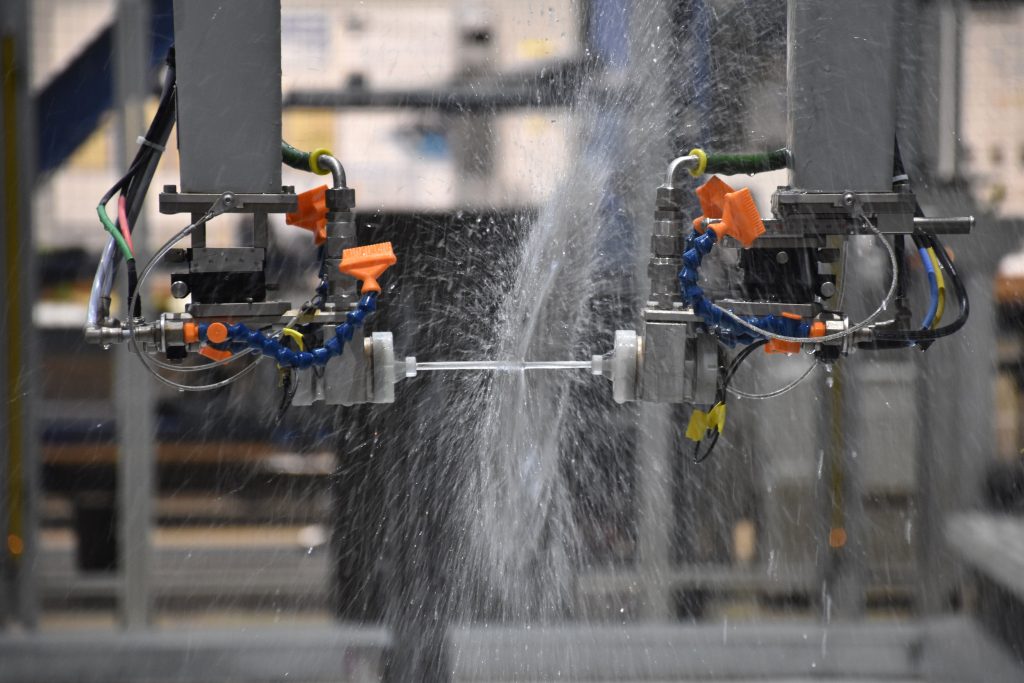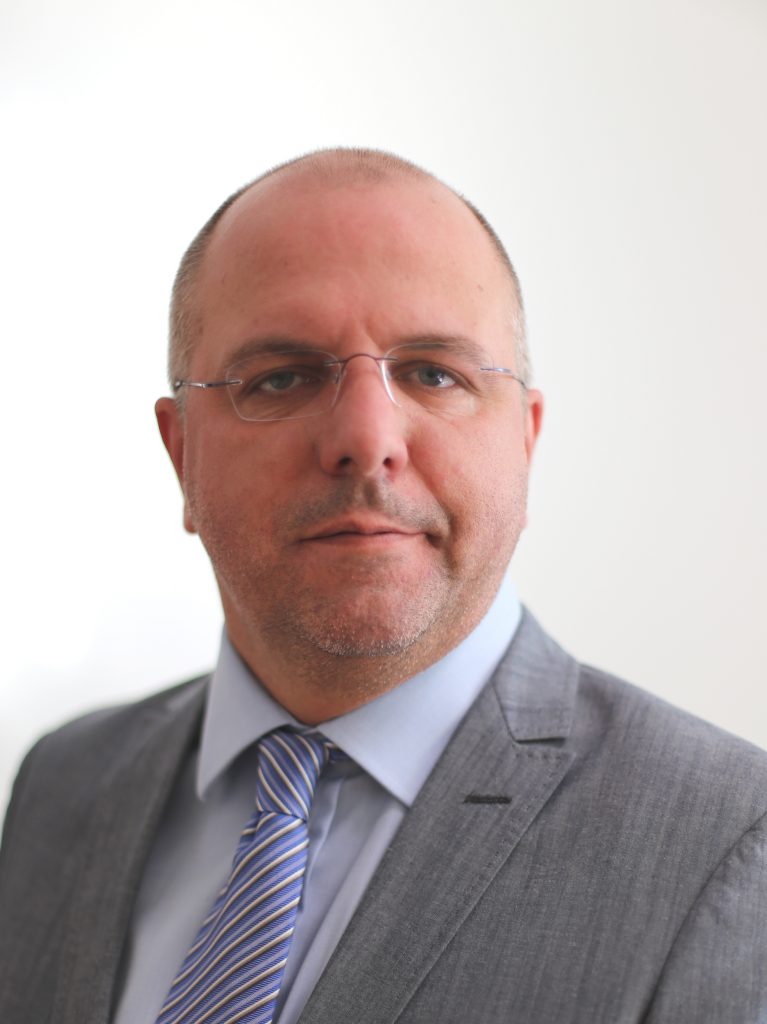The GKN Aerospace plant in Munich specializes in producing composite aircraft parts. As safety-relevant components, they are subjected to extensive non-destructive testing. ACCUBOT, a multimodal system with highest levels of flexibility and dynamism, allowed GKN to significantly increase the productivity and reliability of its non-destructive component testing, thereby safeguarding its outstanding position on the world market.
Gurten, June 15, 2021 – As a leading supplier of components for the aircraft industry, GKN Aerospace produces aircraft parts exclusively from carbon-fiber composite materials at its Munich plant. Aircraft components are safety-relevant, so they are subject to the strictest quality requirements. GKN subjects 100% of the parts to an ultrasonic inspection in order to detect irregularities, such as inclusions of foreign matter, delamination, or porosity. The inspection times for non-destructive component testing (NDT) were as long as 100 minutes on the existing system.
Efficiency gain through multimodality
The key criteria in the new tender for the NDT inspection system were a substantial reduction in inspection times and the option for other measurement and testing methods to be implemented on the system, in addition to the intrinsic ultrasonic inspection. The globally active Austrian machine and plant engineering company Fill Gesellschaft m.b.H. offered a solution with two articulated robots on linear axes running in parallel.
These can inspect workpieces in three separate zones, jointly in one of them. Automatic tool changing with the Fill FlexChange tool changer allows tests to be conducted with different methods, such as phased array pulse-echo testing or through-transmission inspections with squirter technology, in one clamping operation. X-ray, tomography, thermography, and non-contact methods for geometry measurement can also be integrated in the system. Active Tool, an inspection head from Fill with an additional rotatory axis, enables through-transmission inspection in small, highly contorted areas.
Flexibility, precision, and time savings
The system obtains its necessary absolute positioning accuracy through high-precision Fill linear axes and additional rotary encoders fitted on the output side on the rotary axes of the ACCUBOT robots. A robot calibration system based on laser tracker helps achieve and maintain this high precision subsequently. This system has reduced the time required for annual geometrical inspections at GKN from 11 hours to half an hour. The application-independent system software with the FILL STUDIO programming and operating environment also brings significant gains in efficiency. It contains a digital twin of the entire system, enables offline programming of the robots during machine operation, and features a unique augmented reality interface.
The huge efficiency gain of the Fill ACCUBOT system results from the significantly quicker inspection processes and the possibility to combine them automatically. “Alone with pulse-echo testing by means of phased array, the inspection time is reduced by 93 %,” reports Dr.-Ing. Jakov Šekelja, Head of Quality Management at GKN Aerospace Deutschland GmbH. “In addition, the several hours of tactile wall thickness measurement performed subsequently in the past now occurs automatically as a byproduct of the ultrasonic inspection.”
Corporate data
FILL is a leading international machine engineering company based in Gurten, Upper Austria. With sophisticated high-tech systems and custom manufacturing solutions for metal, plastics and wood, Fill makes its customers the best in their fields. The automotive, aviation, sports and building industries all benefit from the expertise of the company founded in 1966. Fill is 100 percent family-owned, and, in 2020, it recorded sales of around 144 million euros with more than 900 employees.
Further information can be found at: www.fill.co.at




